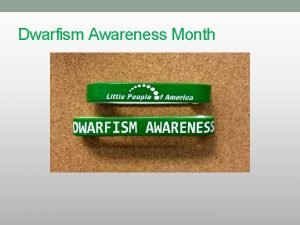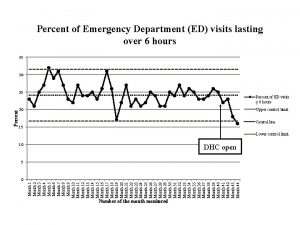Stress Awareness Month April 28 2021 2020 2021







- Slides: 7

Stress Awareness Month April 28, 2021

2020 -2021 A Year of Stress Awareness • You may be thinking that the last year has been a constant reminder of life’s stressors…very true. • The purpose of Stress Awareness Month is to help individuals learn about different types of stress as well as ways to cope. • Learning to identify signs of extreme stress is important, especially for children. Long-term poorly managed stress can have significant physical and mental effects in children and adolescents. • Given the challenges of the past year, it is particularly important to monitor your family’s stress.

Types of Stress comes in multiple forms and some stress is good for you. • Positive Stress seems counterintuitive BUT small doses of positive stress and your brain’s reaction can be helpful. For example, you are prepping for a big game and the day has arrived for play. Positive stress releases cortisol and can help increase your focus to perform your best. • Tolerable Stress is a stress response to a significant change, challenge, or significant life event. While these situations can be difficult to manage, proper support can mitigate damages. • Toxic Stress is concerning due to its potential for long-term, harmful effects. Toxic stress results from long-term or frequent exposure to stressful events. Negative feelings accumulate over time and without management, result in negative physical and mental health concerns.

Signs of Stress • Stressors are constantly present in our children’s lives, even if we do not perceive them to be stressors. • It is important to monitor your child for signs of long-term stress in order to respond. • Physical Ailments (i. e. headaches, stomachaches) that do not respond to typical treatments • Anger/ Irritability that is often misplaced. For example, a significant response of anger to a minor irritation or lashing out at a loved one. • Anxiety/ Withdrawing can be seen when children display worry over seemingly unrelated issues. This worry can seem irrational or constant. Children may also separate themselves from family and friends. • Difficult concentrating is often caused by a child’s brain being overly focused on a stressor. • Recurring illness unlike the ailments mentioned above come from an individual being “run down. ” Chronic colds, fatigue, and other ailments can be a result of an immune system that has been impacted by chronic stress.

Coping with Stress • The most important factor in stress management is naming and identifying stress. For children, it can be challenging to pinpoint the source of stress. • Talk to your child about their feelings. How did you feel when…? What did you think about…. ? • Once you identify a stressor, talk to your child about practical solutions. Avoid saying things like “it’s okay” or “you don’t need to worry about that. ” • Reassuring statements should be accompanied by tangible actions. For example, if your child is worried about getting sick you might say “I know germs can be scary. When we wash our hands, it helps us stay healthy. ” • Practice scenarios that may be stressors to give your child positive strategies. For example, for a child who is nervous about starting school, you can practice getting ready in the morning, the route to school, a school tour (if possible), and have practice conversations pretending to be the teacher. Encourage your child to pick the scenario and respond to it together.

Stress Management Strategies • Exercise doesn’t have to be a full workout. Have a dance party, go for a family walk, or play a movement-based game. • Endorphins released from exercise help counter feelings of stress. • Mindfulness can help your child center their thoughts and identify what they are feeling in a particular moment. This is helpful for pinpointing stressors. • Healthy eating allows your child’s body to recharge and be physically prepared to cope with stress. Of course, treats and fast food aren’t the end of the world, but it is important to seek balance. Foods that are high in sugar or contain caffeine can exacerbate feelings of stress. • Check out a list of healthy snacks here https: //tastesbetterfromscratch. com/50 -healthy-kids-snackideas/ • Turn healthy snacking into a fun activity by preparing the recipe together.

Stress Management Strategies • Pray together. Model asking for God’s help and grace during challenging times but also practice gratitude prayers at the beginning/ end of each day. • Have your child name 2 -3 good things in their life that they want to thank God for. A gratitude mindset is important for stress management. • Schedule art time. Use coloring or painting to destress together. Avoid activities that require many moving parts/ directions. The goal of coloring is to be able to let go and just spend time together. • Create a support system. “We all need somebody to lean on” isn’t just a song lyric. Children AND adults need an outlet. • Parents may be a child’s go-to support system but remember there always professionals who can help if you feel the stress may be too much for you to manage alone.












